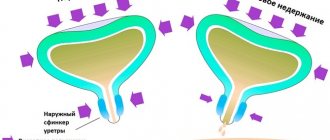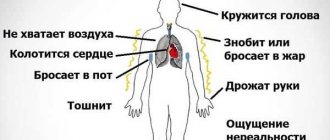| Mild mental retardation | |
| ICD-11 | 6A00.06A00.0 |
| ICD-10 | 70. |
| ICD-9 | 317317 |
| MedlinePlus | 001523 |
| eMedicine | med/3095 neuro/605neuro/605 |
| MeSH | D008607 |
Debility
, less commonly
moronism
(from the Latin dēbilis - “weak”, “infirm”; English moron, feeble-minded, high-grade defective[1]) is the weakest degree of mental retardation, caused by developmental delay or organic damage to the fetal brain.
First isolated by Valentin Magnan in 1890[2]. The terms “moronicity” and “moron” are outdated and not recommended for use, since they have gone beyond a purely medical framework and began to have a social (negative) connotation[3]. In English-speaking countries, the situation is similar with the term "moron", a word coined in 1910 by psychologist Heinrich H. Goddard. The word "moron" was used to denote mild mental retardation until ICD-9[1]. To denote pronounced morons in Russian, it was proposed to use the word moron
, derived from ancient Greek. μωρός “unreasonable”, “reckless”, “stupid”[4], but the term is not widely used[5]. Instead of these terms, some guidelines suggest using a neutral term from ICD-10, according to which “debility” corresponds to the diagnosis of “mild mental retardation” or “mild mental retardation”[3]. Nevertheless, in the psychiatric literature and literature on oligophrenopedagogy, the traditional terms “moronism”, “imbecility” and “idiocy” continue to be used [6][7][8][9].
Description[ | ]
With mildly expressed debility, the child may not differ in any way from his peers. Mechanical memory and the emotional-volitional sphere are preserved. Attention is very difficult to attract and fix. Memorization is slow and fragile. They have a predominant concrete-descriptive type of thinking, while the ability to abstract is almost absent[10]. Nevertheless, they can form the simplest generalizations[11]. They find it difficult to grasp the entire situation, and usually they only grasp the external side of events[10]. It is difficult to perceive logical connections between objects, the concepts of “space”, “time”, etc. Speech disorders are common (lags in development, distortion of sounds, violations of the grammatical structure of speech, poor vocabulary). Although there may be a fairly large vocabulary, the speech is still poor and monotonous[11]. Usually they cannot retell what they read or heard. However, some morons, with a delay in general mental development and low productivity of thinking, are characterized by partial giftedness (up to the savant syndrome): excellent mechanical memory (without understanding what is being repeated), the ability to perform complex arithmetic operations in the mind, the ability to draw [12], absolute pitch, etc. [10]. With a more severe degree of oligophrenia (imbecility), giftedness also occurs. Emotions that are relevant at the moment prevail. Actions are not purposeful, impulsive, and negativism is developed.
Morons cannot cope with the program of a basic general education school; they usually graduate from primary or auxiliary school and are able to lead an independent life[11]. They are able to assimilate special programs based on concrete visual learning at a slow pace[2]. The most difficult subjects for them to study at school are physics and mathematics[12]. Social adaptation and participation in independent work are possible. Morons can master a simple specialty, sometimes even very well[10]. Emil Kraepelin o[12].
In a familiar environment, morons are relatively adequate and independent[2]. They can live independently, but most often require guidance and support[10].
Morons are capable of falling under the influence of other people, as they have increased suggestibility[11]. Because of this feature, they can be used as a weapon for criminal purposes[13]. They also often easily adopt other people's views and subsequently firmly adhere to them, while lacking in their own judgment[10]. They tend to memorize various rules and expressions that are used in a stereotyped manner[10]. Some even tend to lecture other people and often talk about what they themselves do not understand (the so-called “salon morons”)[12]. They also have an underdeveloped ability to suppress impulses and self-control[11]. In general, their volitional and emotional qualities are better developed than those of imbeciles[11]. Often there is an increase in primitive drives, in particular sexual drive, accompanied by promiscuous behavior[10].
Morons exhibit some clumsiness and sweeping movements[11]. Sometimes neurological disorders and anomalies of physical development occur, in fact, as with other forms of mental retardation[11].
Noticed [ by whom?
], however, that patients with a mild degree of debility for the most part are quite good spouses, low-conflict, obedient and manageable.
Morons are distinguished among eretic (excitable), sluggish, apathetic, maliciously stubborn, vengeful and torpid (inhibited). Their character can be good-natured, affectionate and friendly, or aggressive with malice, stubbornness and distrust of others[12].
All interests of those suffering from debility are primarily concentrated on satisfying instincts (food and sexual), as well as on their appearance[13].
Oddities of terminology and complexity of the syndrome system
Other oddities arise when we deal with borderline states. Then phenomenal terms appear - “schizophrenia in the stage of debility” and the like. Schizophrenia does not have such a stage, no matter what class it belongs to. If a child has a developmental disorder and mental retardation, then in addition to this, schizophrenia may also be observed. Or maybe depression. And his teeth may also hurt. Everything is possible, but this does not mean that schizophrenia appears in the stage of debility.
Schizophrenia and oligophrenia are not directly related to each other. Everything that happens to a person who has a congenital mental defect due to the presence of brain pathology is explained by this pathology. Oligophrenia has its own classification of severity, but all this does not need to be classified as schizophrenia.
Some kind of dementia in schizophrenia is of course possible, but first we need to define what we mean by dementia itself. If this is the name given to the consequence of splitting the thinking process, then 100% of schizophrenics are weak-minded. What happens to oligophrenics may resemble what happens to patients with some types of schizophrenia. Only even patients with severe forms of catatonic schizophrenia can become almost normal people for some time, but nothing is known about the healing of oligophrenics or at least remission. So there is no need to produce mixes of “schizophrenia and oligophrenia” and the like.
The main forms of schizophrenia are based on delusions. It does not hang in the air, but is a consequence of a violation of the thinking process. This does not mean that a person has become smart or stupid. At the time of the malignant course of the episode, it is impossible to approach it with such standards.
An ordinary person read an article in a newspaper, did not understand its advertising essence and made a purchase of an item that he did not really need. He was simply mistaken. A schizophrenic can buy the same thing, but he will also make a mistake, but because a voice in his head will tell him that having the thing will save him during the end of the world. Then the voice will say a lot more “interesting things” and he will continue to live with an orientation towards this phantom. Schizophrenia and mental retardation can only be related by the patient himself. A moron can also hear a voice in his head. But anyone can hear the voice, regardless of their level of development.
The non-standard nature of the disease creates another difficulty. I just want to write “schizophrenia” in the plural; it is certainly somehow connected with the mind. But in addition to the paranoid form, isolated separately for its strangeness, hebephrenic and also distinguished, but already for its severity, catatonic schizophrenia, there are also schizoid disorders and paranoid, schizoid personality disorder, and not just a delusional disorder. And that’s not all, because in combination with the signs of bipolar affective disorder, schozoaffective disorder is obtained. Such a complex system does not fit well with the standard medical vocabulary. If the concept of “malignant course” is somehow explainable, then “complications” in schizophrenia simply confuse everything.
Intelligence remains the same, but if the symptoms of schizophrenia are not stopped, then there will be no benefit from it...
After all that is written here, the phrase that intelligence does not change in schizophrenia will sound defiant, but it is true. For a moron, he will remain at the level of a moron, and a mathematician during a period of remission will be able to do his research. Schizophrenia impairs mental abilities at the level of:
But it does not change the level of development. If the patient deteriorates, it is only because the disease tied his hands, forced him to drink alcohol, and gave rise to a tendency towards autism. By some magic, remove all the negative things created by schizophrenia, and the person will be the same - no stupider and no smarter.
Help for schizophrenia cannot be viewed as an attempt to remake thinking. Not redoing it, but blocking what caused the change. Since no one knows the true reasons for the appearance of what caused it, the development of psychiatry is proceeding with great difficulty. Usually they talk about remission in 30% of cases. This should not be taken to mean that the remaining 70% sit like vegetables and drool or run around the wards from aliens. Fortunately, it's not that bad.
psycholekar.ru
Forms[ | ]
Depending on the level of intellectual development, the following forms of debility are distinguished:
- Mild form, IQ 65-69.
- Moderate form, IQ 60-64
- Severe form, IQ 50-59
To determine the form of debility, a complete clinical examination is used. The degree of development is determined in accordance with the diagnosed form of debility.
In ICD-10, all forms of retardation (IQ 50-69) are classified under heading 70 (mild mental retardation).
To indicate the degree of behavioral disorders, a number is added after the period:
- 70.070.0 minimal or no behavioral disturbances;
- 70.170.1 significant behavioral disturbances requiring attention or therapeutic measures;
- 70.870.8 other behavioral disorders;
- 70.970.9 behavioral disorders not defined.
Forms of imbecility
Wikipedia describes moronism in more detail. The main forms of imbecility:
- IQ 65-69 – mild imbecility;
- IQ 60-64 – moderate form of the disease;
- IQ less than 60 is a severe form of the disease.
How to cure moronism? Treatment of debility with the help of medications and folk remedies is not effective. The best way to treat dementia is correctional. For these purposes, special boarding schools are created in which patients are taught the necessary skills. As the statistics of morons show, patients can lead the life of an ordinary healthy person - find a job, start a family and take part in all sporting events.
Author of the publication
offline 20 Opening hours
Contraindications[ | ]
| This section is missing references to information sources. Information must be verifiable, otherwise it may be questioned and deleted. You may edit this article to include links to authoritative sources. This mark was set on January 3, 2020 . |
- Service in the armed forces.
- Service in state and municipal bodies.
- Access to state secrets.
- Driving motor vehicles of all categories (A, B, C, D, E).
- Control of other complex technical mechanisms (cranes, loaders, conveyors, etc.)
- Work involving the use of chemical (toxic) or explosives.
- Security activities.
- Carrying and purchasing weapons.
- Work as a driver and other work related to train movement.
- Work as an engineer, foreman (individually).
A medical examination by a psychiatrist is mandatory. Admission to work in some professions is determined individually by a psychiatrist.
Moronism: causes of the disease and its clinical manifestations
Moronism is a disease of the central nervous system, which consists of a decrease in the level of intellectual abilities. This is a mild form of oligophrenia (mental retardation). There are a large number of reasons why this disease develops. The most important ones are the genetic factor and pregnancy, which was difficult for the mother. Thanks to proper and comprehensive treatment (with the help of medications, professional help from psychologists, speech therapists and teachers), it is possible to smooth out the manifestations of this disease.
Moronism is a mild degree of oligophrenia. This type of pathology is the most common in humans (about 75%). Along with the term “debility” in medicine and psychology, names such as “mild mental retardation” and “mental subnormality” are used.
The main cause of this disease is hereditary predisposition. The causes of the development of the disease include infectious diseases (rubella, measles, cytomegaly, syphilis), Rh conflict and fetal hypoxia. Smoking, drinking alcohol and using drugs affect the appearance of this disease in a child. Moronism can occur due to trauma during childbirth, asphyxia of the newborn, diseases that the child suffered in childhood (encephalitis, meningitis), and traumatic brain injuries.
At this stage of the disease, patients are capable of studying in a special program of auxiliary schools. They can master certain work skills. This form of mental retardation is characterized by the fact that children have good speech development. The main symptoms of this disease are:












